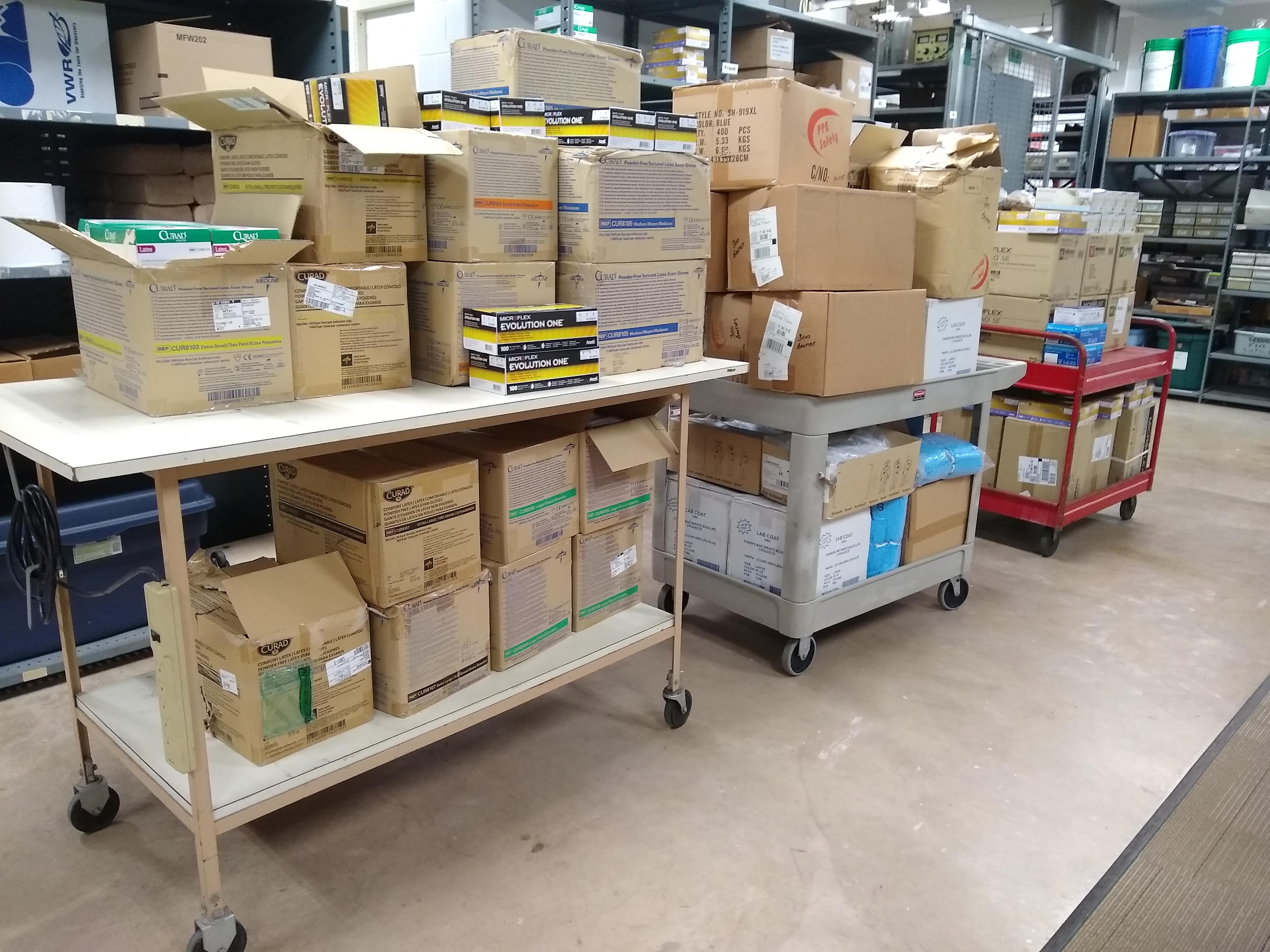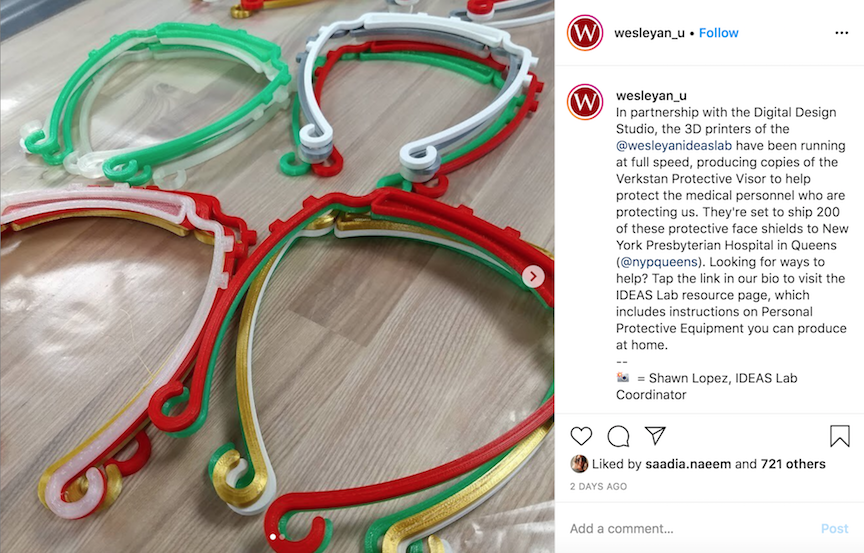
As hospitals across the world experience shortages of personal protective equipment (PPE) and other medical supplies, University faculty and staff are working to support medical professionals in their fight against COVID-19. In conjunction with the Digital Design Studio, the Integrated Design, Engineering, and Applied Sciences (IDEAS) Lab is working to produce Verkstan Protective Visors, with all expenses covered by the University. Additionally, faculty and staff have collected a total of 15,650 pairs of gloves, 700 bonnets, 2,300 show coverings, 100 protective sleeves, 261 lab coats, 37 pairs of goggles, and 1 box of surgical face masks from various locations on campus to donate to Middlesex Health and Middletown Health Department.
On Tuesday, March 31, the first two hundred visors were shipped to NewYork-Presbyterian Hospital in Queens, New York. This location was decided by the 3D printer company MatterHackers, which acts as a middleman between people with 3D printing capabilities and hospitals in need of materials.
The visor was designed by Erik Cederberg of 3D Verkstan, a 3D printing service based in Denmark. The visors are specifically designed to be used by medical professionals treating COVID-19 patients, and work in combination with N-95 masks to increase protective efficacy.

College of Integrative Sciences Makerspace Coordinator Shawn Lopez came across the design while browsing reddit.
“I’m on 3D printing and I’m on the COVID-19 subreddits and I’ve just been keeping track of what is happening out there,” Lopez explained. “I saw that the Verkstan Protective Visor—which we’re printing right now—that was one of earliest designs that was offered out that was actually approved by some hospitals in Switzerland I believe. So as soon as we saw that happening, and realized we had plenty of available capacity, I just signed us up and basically started running.”
The template is easily accessible online for anyone to 3D print, if they have access to a 3D printer and filament (the material used to make the visors).
“That’s one of the great things about rapid prototyping that we’re following,” Lopez explained. “We don’t have to make molds, we don’t have to go back for new tooling, all we have to do is create a new file and print a new file.”
Lopez explained that the lab’s projected yield depends on what’s to come in the next few weeks. Right now, while faculty and staff are encouraged to stay at home, they still have access to University facilities. Between the five 3D printers in the IDEAS Lab, and the eight in the Digital Design Studio, Lopez predicts that they can produce about 40 visors per day. However, if a University-wide lockdown were to occur where no one was allowed into buildings, that would substantially reduce the projected yield.
“Access to the space, access to the materials, access to the tools is going to be really important to continue this,” Lopez said.
Lopez is optimistic, however, that they will not run out of supplies.
“As long as the supply chains stay up, we’re going to be just fine,” Lopez explained. “Amazon is still shipping things. MatterHackers themselves, they sell filaments and they can bypass Amazon shipping and just ship it to us. So far supply hasn’t been a problem.”
Lopez emphasized that there are procedures in place to ensure nothing gets contaminated in the process of printing and shipping the visors.
“Surfaces have been disinfected and covered with plastic where they are periodically re-sprayed with isopropyl [an alcohol-based cleaning solution],” Lopez said. “The completed visors are also treated with alcohol before being bagged up. And we are wearing gloves and masks while we work. The hospitals will also be doing their part when they receive items as they can’t count on everyone to follow procedure.”
The University has also donated PPE from research labs in Hall-Atwater and Shanklin, as well as from animal care facilities (where lab animals used for scientific experiments are stored) and the stockroom in the basement of Hall-Atwater.
“It’s as much as we can give and still maintain a small supply for researchers and staff,” Manager of Scientific Facilities and Instrumentation Camille Keeler wrote in an email to The Argus. “We would normally use most of this over the course of a semester, but with few students and researchers in the building, we decided to send what we could to Middlesex Hospital and Middletown Health Department to distribute.”
About half of the glove and surgical mask supply was given to Middlesex Hospital, while the rest of the equipment will go to the Middletown Health Department. According to Keeler, the University will likely reimburse the departments when PPE supplies are available to be purchased again.
Even if you don’t have a 3D printer or ample supply of protective equipment laying around to contribute, there are many ways for students, faculty and staff to help from home.
“If you go to wesleyan.edu/ideas/COVID19.html, I put together a full page of resources there,” Lopez said. “If you have a sewing machine at home, there are plans for what you can do with a sewing machine. If all you have are scissors and a hole punch, there are plans to let you participate in that too. Look to your hospital resources pages locally and you’ll probably find places to donate.”
Hannah Docter-Loeb can be reached at hdocterloeb@wesleyan.edu.


Leave a Reply